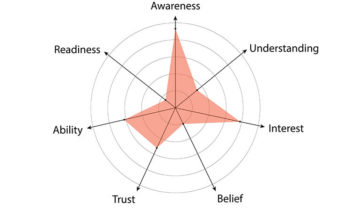Firms Reflect the Values of Its Leaders
Mirror Images
Attribution error is rampant when it comes to founders and CEOs. Nevertheless, I find myself agreeing with Tom when he says,
Companies are a near-perfect reflection of the values of their founders.
Personally, I would substitute “leaders” for “founders.” Clearly, Harry Wallace, the founder of PIE, made a permanent imprint on the firm. However, I’ve observed first-hand how Tom’s values and perspectives have shaped PIE since he became CEO.
Hiring for Excellence
As How Clients Buy co-author, Doug Fletcher, notes in Learning from Rainmakers, “At the end of the day, doing great work is the best thing you can do to win new business.” Excellence may not be sufficient, but it’s necessary.
To that end, Tom has emulated other high-performing professional services firms by making hiring for excellence a cornerstone of PIE’s strategy. Tom summarizes his philosophy:
Excellence comes at the margin. Excellence doesn’t come from finding a great person. It comes from seeing three great people and finding and choosing the one that’s just five or 10 percent better than the other two…Then it becomes a matter of standing out of the way and letting them create the culture that is the reflection of their values.
Curiously, when I listen to this Peace Corps veteran speak about leadership, I’m reminded of a core philosophy of the Marine Corps. Tom and his Marine counterparts emphasize the clarity of intent over the immediate task. From Warfighting:
The task denotes what is to be done, and sometimes when and where; the intent explains why. Of the two, the intent is predominant.
It’s not enough to hire great people. They need to have a shared understanding of intention, the freedom to shape the requisite tasks, and the propensity to act.
Globalization means that you can reach the world—but so can your competitors. Excellence is a baseline requirement. In professional services, it starts with how you hire.
Building Slack Into the System
The world is uncertain. Businesses are subject to cycles. Efficient systems are inherently fragile. Consequently, it’s imperative that leaders of expert services firms design some degree of slack into their businesses.
“Make hay when the sun shines,” goes the proverb. It’s what guides the opportunistic growth of some firms. However, in their desire for additional capacity, such firms are tempted to relax their hiring criteria. Maybe not much, but, as Tom reminds us, excellence is at the margin.
When the downturn comes—and it always comes—firms are faced with a cash crunch. Since the majority of their expenditures are associated with personnel costs, the “logical” action is to layoff people. Cash flow is improved and underperformers culled.
Tom takes a different approach. Over the years, I’ve seen how PIE has become much more strategic and discerning regarding who they take on as clients. They have simultaneously ramped up their business development efforts and become more selective. They seek great clients as well as excellent employees.
Even so, PIE isn’t immune from the business cycle. However, instead of layoffs, Tom has implemented a policy of maintaining a very liquid balance sheet. The management team at PIE are all shareholders, so this isn’t a case of management padding their beds to allow for a comfortable night’s sleep at the expense of shareholders. Instead, it’s a strategy that creates an environment that supports a focus on performance over time.
The Wisdom of Peers
PIE facilitates peer roundtables sponsored by leading professional service firms. Members consist of C-level executives at many of the world’s largest companies. The premise of the roundtables is that peer learning is highly effective because the conversations are timely, relevant, and situated.
Tom and his colleagues, therefore, have been in the catbird seat from which to observe the ongoing conversation about business development in professional services. Furthermore, seeking the wisdom of peers is ingrained in the firm’s culture.
Tom and Doug didn’t start their collaboration in order to write a book. They sought answers to the question, “How does business development really work in the context of professional services?” Naturally, Tom and Doug started by talking to as many leaders in the professional services field as possible.
In other words, they didn’t start with a theory and then seek confirming evidence. Rather, Tom and Doug sought evidence of practical reality, identified emerging patterns, and then codified those patterns in a manner that could be effectively shared with others.
The Purpose of Business
The goal of management is to maximize performance over time. That begs the questions, “What constitutes business performance, and what is the purpose of business?” The pat answers are profit and profit maximization.
I don’t buy it. I’ve argued elsewhere that profit is a requirement of business not the objective for many of us. Tom’s answer is,
The purpose of business is to serve us in our lives.
Tom is one of the most pragmatic businesspeople I know. He can be hard-nosed when circumstances demand. (After all, he did a tour of duty in the private equity business.) He takes a hands-on approach when it comes to meeting the requirements of profit and delivering an attractive return on investment.
The notion that business serves our lives provides Tom with practical guidance. It shapes decisions regarding hiring as well as customer selection. In contrast, while shareholder value is relatively easy to measure, it’s not much of a compass.
Ultimately, Tom and Doug advocate an approach to business development that reflects the pursuit of a life worth living:
A life worth living is one that sits at the intersection of wrestling with a difficult problem, using your best talents, and doing work that is consequential.
It’s what attracted most of us to a life in professional and expert services. Isn’t it practical to let the goal of a life worth living serve as our true north?




